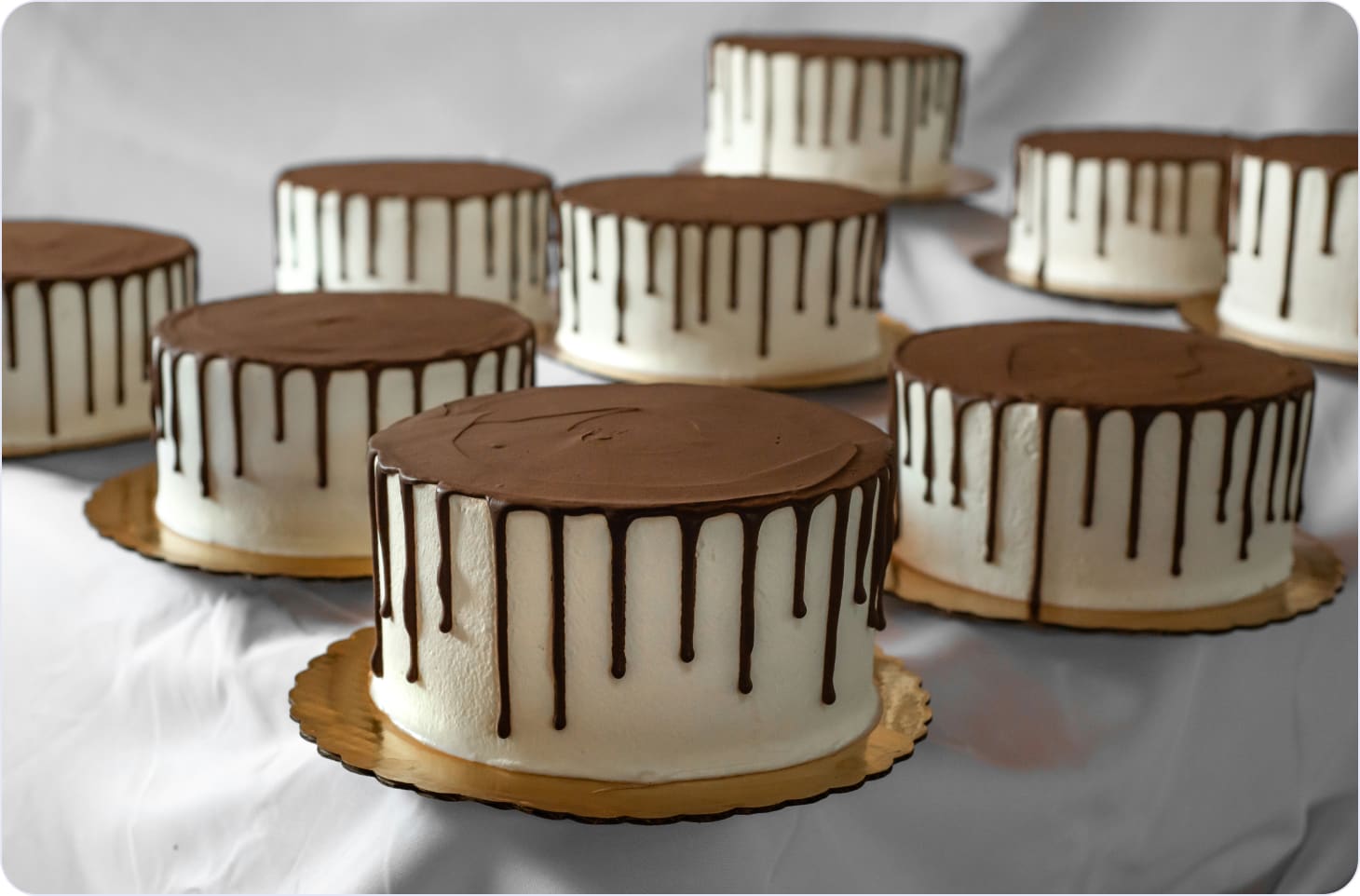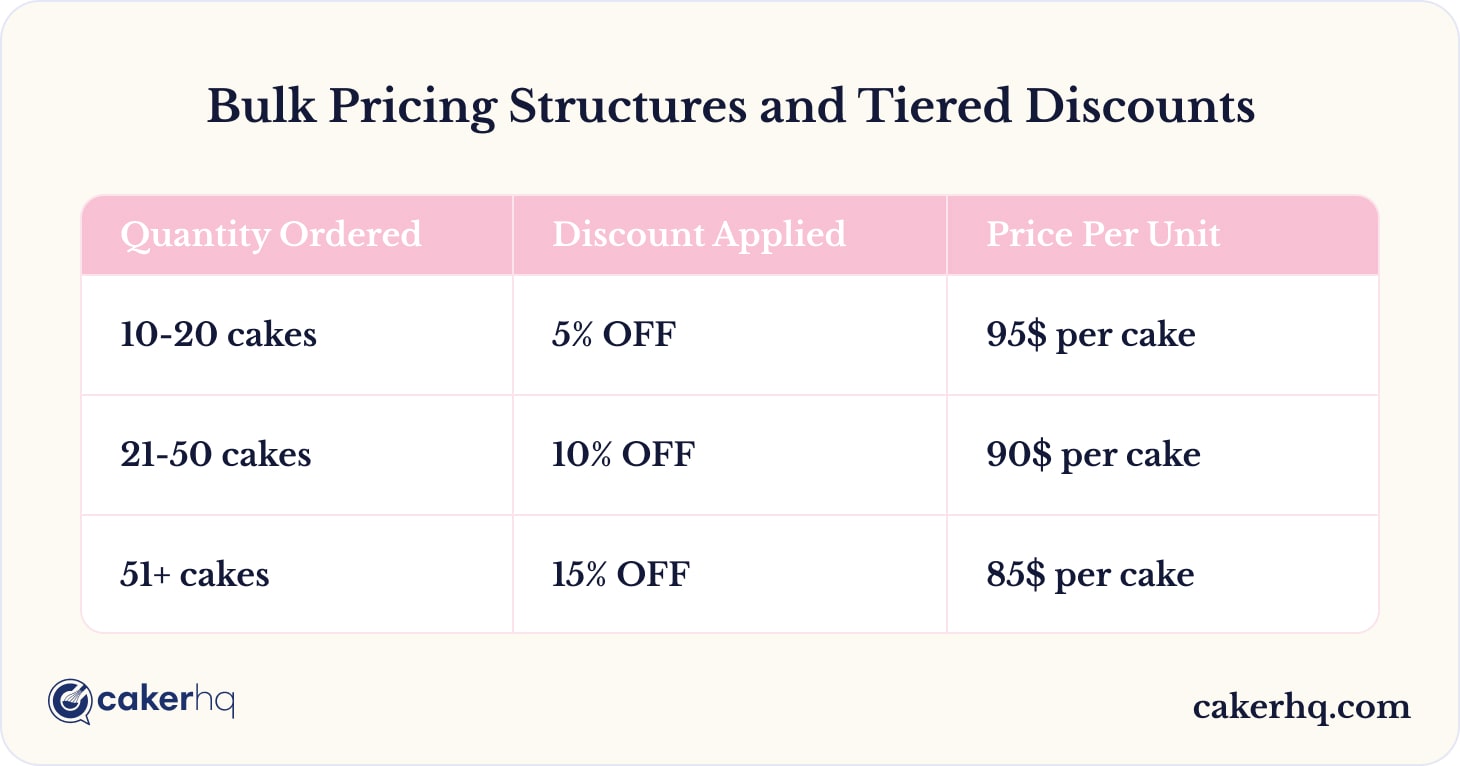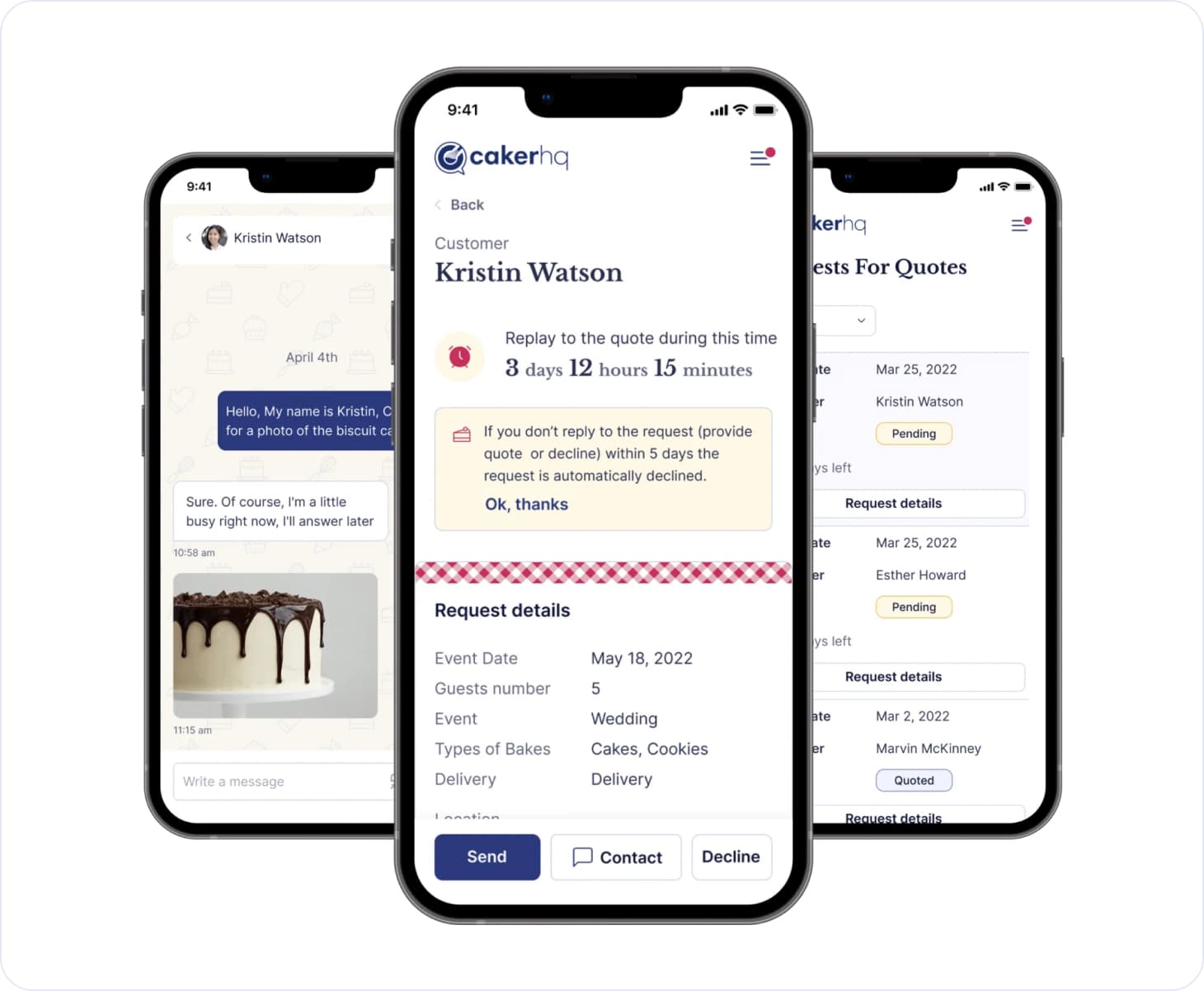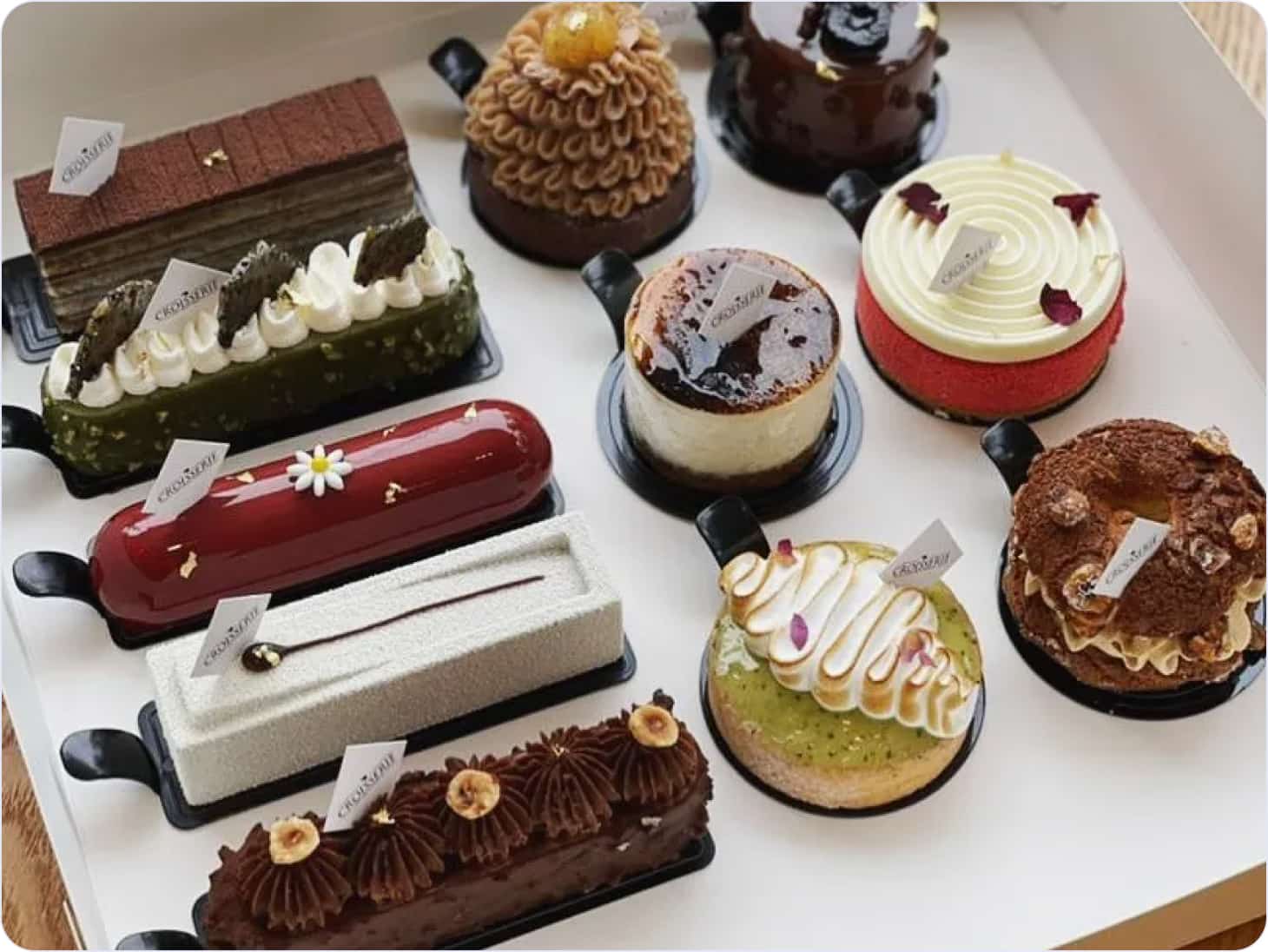Handling bulk orders for weddings and corporate events can be incredibly rewarding—with the right preparation, it’s a fantastic way to grow your cake business. Even at the lowest level, it requires careful coordination between a cake maker and a buyer. Other than that, large-scale cake orders must be managed with precision, from custom design requests and ingredient sourcing to production, delivery, and presentation.
The rewards can be substantial—bulk orders often lead to high-value sales and new repeat clients. For cake makers, bulk orders are an opportunity for high-value sales. The only thing left to do is work with challenges and find solutions or workarounds. So let’s explore this process, see what challenges you may face, what solutions you can come up with, and how to handle bulk orders for a variety of events.
Understanding bulk orders in the cake-making business
Bulk orders are all about large-scale requests for cakes, cupcakes, or other baked goods you offer. They’re often needed for big events, from weddings to corporate functions. Unlike standard single orders, these require careful planning, consistent quality control, and efficient production management to meet customer expectations.
Quite simply, a bulk order typically involves:
- Large wedding cakes. Multi-tiered, custom-designed cakes meant to serve dozens or even hundreds of guests.
- Corporate branding cakes. Cakes featuring a company’s logo, colours, or theme, often for product launches, anniversaries, or promotional events.
- Dessert tables. A variety of cakes, cupcakes, cookies, and pastries, presented in an artistic display for large gatherings.
- Wholesale orders for catering or events. A high-volume request for smaller cakes, cupcakes, or cookies to be served at banquets, meetings, or large social events.
Source: Unsplash
Why bulk orders require special handling
Unlike traditional smaller everyday orders, bulk orders require an entirely different approach. The bigger the order, the more meticulous attention to detail is required.
Firstly, larger quantities require better organisation. From ingredient sourcing to production scheduling, bulk orders demand structured planning to meet deadlines.
Secondly, with bulk orders, more logistics are involved. Wedding cakes may require on-site setup, while corporate orders may involve mass production and packaging for distribution.
Lastly, there are always customisation challenges. While corporate orders focus on uniform branding, wedding cakes demand artistic detailing and intricate handmade elements you need to be ready for.
Setting up a bulk order system on the marketplace
Unlike individual cake orders, bulk purchases for weddings, corporate events, and large gatherings require clear communication, customised pricing, and well-defined order minimums. To manage bulk orders smoothly, it helps to have a clear system in place. When setting up bulk listings on the marketplace, consider including:
- Product variations. Specify different cake sizes, designs, and flavours available for bulk purchase.
- Customisation options. Allow buyers to choose colours, themes, dietary preferences (gluten-free, vegan, nut-free, etc.), and corporate branding options.
- Lead time and order deadlines. Indicate the required notice period for large orders (e.g., 2 weeks for weddings, 1 week for corporate events).
- Delivery and pickup details. Clearly outline delivery zones, fees, and pickup options for bulk orders.
- Bulk order FAQs. Address common concerns, such as storage recommendations, refund policies, and sample requests.
Providing bulk pricing structures and tiered discounts
Bulk orders often come with discounted pricing based on the quantity ordered. This is often called a tiered pricing model, and it can incentivise larger purchases while ensuring profitability. Here’s a quick example.
Setting clear minimum order quantities (MOQs) for large orders
To balance profitability and production efficiency, define MOQs for bulk purchases. This prevents small orders from being treated as bulk requests and ensures that time and resources are used efficiently.
For example, for wedding orders, you can set a minimum order of 1 multi-tiered cake or a combination of a main cake + dessert table items.
With corporate cupcakes, you can set a minimum order of 50 cupcakes for corporate events or branding promotions. The same goes for wholesale orders: set a minimum of 5 cakes per order for hotels, catering businesses, or event planners.
After all, minimum order quantities help ensure that your time and resources are used efficiently by focusing on larger orders.
Looking for more clients for your bakes? Find them with CakerHQ. Join today!
Effective communication between buyers and cake makers
Clear and efficient communication is anotheressential part when it comes to handling bulk orders. Unlike smaller orders, bulk purchases are much more complex, requiring buyers and cake makers to stay aligned throughout the process.
On CakerHQ, you can facilitate such interactions, as both parties can discuss requirements, track progress, and make sure everyone is happy at the end. Here’s how our platform can help you.
How buyers can request quotes and discuss custom requirements
For bulk orders, you can set pricing and customisation options differently based on the event type, quantity, and design specifications. Instead of using a fixed-price model, CakerHQ offers customers the option to use quotes for their orders. Thus, they can specify:
- The type of event (wedding, corporate gathering, gala, etc.);
- The type of bakes;
- The size of servings per person;
- Design preferences (colour themes, branded elements, toppers, edible prints);
- Dietary restrictions (vegan, gluten-free, nut-free options);
- Delivery or pickup preferences.
- You can also invite clients to share special requests or reference photos.
Importance of early consultations and clear expectations
For weddings and large corporate events, last-minute changes can create logistical nightmares. That’s why early consultations are key to smooth execution.
Set realistic timelines. Inform your customers that they should place bulk orders weeks or months in advance so that you have enough time for:
- Recipe planning and ingredient sourcing for large orders;
- Custom decorations and branding elements that require special tools;
- Scheduling production alongside other pending orders.
Confirm key details. You should document every specification from the first consultation, including:
- Agreed design, flavour, and decoration specifics;
- The deadline for final changes (e.g., last-minute guest count adjustments);
- Payment terms and deposit requirements to secure the order.
Plan for revisions. For fully custom designs, a midway check-in with a sample or digital preview ensures that both parties stay aligned on expectations.
Managing production and logistics for large orders
If you're new to offering bulk orders, you know that handling large cake orders for weddings and corporate events requires a structured approach to production, ingredient management, and delivery logistics.
Scaling up operations without affecting quality is of utmost importance. Here are several tips so you can simplify this transition.
Scaling up production without compromising quality
For maximum efficiency and to maintain consistency, large orders must have a clear, even well-documented production process. Therefore, consider the following:
- Prepare batches. This means organising production into smaller, manageable batches. This helps to prevent errors and ensures uniformity across all cakes.
- Create pre-baking components in advance. Certain cake elements (i.e., fillings, decorations, or sponge layers) can be prepared in advance. All that’s left is to store them under optimal conditions.
- Come up with standardised recipes. These will greatly help you in achieving consistency. It is needed in the texture of your cakes, their flavour, and their appearance. Thus, first and foremost, you must use precise measurements and follow documented procedures.
- Collaborate with a team (if applicable). In case you have people working with you, delegating work among team members is crucial. Assign specific tasks like baking, decorating, and packaging to different team members to improve workflow efficiency and divide areas of responsibility.
Handling ingredient sourcing and storage for large batches
Bulk orders require reliable access to large quantities of ingredients, not to mention that you have to make sure they’re fresh and top quality.
Strong ingredient management starts with reliable supplier relationships. Establishing partnerships with trusted suppliers ensures a steady supply of essential ingredients. Besides, buying in larger quantities helps reduce costs and ensures availability during peak seasons.
On your end, storage management is no less important. For instance, proper refrigeration and dry storage conditions extend ingredient shelf life and prevent spoilage. In another article on CakerHQ, we went in-depth about proper equipment and storage options. Feel free to check it out, as a well-organised inventory system allows for better ingredient forecasting, reducing waste, and preventing last-minute shortages.
Coordinating delivery logistics
Transporting large cakes to event venues requires careful planning to prevent damage and ensure on-time delivery. Key considerations for logistics management include:
- Choice between local and long-distance suppliers. Local sourcing reduces transportation time and potential delays, while long-distance suppliers require reliable shipping arrangements.
- Selecting the right transportation method. Refrigerated transport is necessary for cakes with perishable fillings, while sturdy packaging prevents structural damage.
- Setting up on-site assembly. For multi-tiered cakes or large dessert tables, assembling components on-site ensures stability and presentation quality.
- Backup plans for delays. Having contingency plans, such as extra delivery time buffers and emergency replacements, helps manage unexpected disruptions.
Ensuring quality control and presentation
For any wedding or corporate event, the quality of your bakes and the way they’re presented is paramount. This, for instance, includes careful attention to how consistent your flavours are, and how accurate are designs and attention to detail in them.
Importance of taste testing and design approval
Before finalising a bulk order, both the buyer and the cake maker must confirm that the cakes meet expectations in terms of flavour and appearance. For such approval, several aspects are important:
First, it’s pre-order tastings. Offering sample tastings for wedding or corporate clients allows them to choose flavours confidently before committing to a large order. Besides, this will also elevate your reputation as a thoughtful cake maker that genuinely cares about their feedback.
Second, you can offer design mockups. Unless you offer something that already exists in your regular menu, you can share a visual reference of the design, such as a sketch, a mockup, or even a small sample This can be done through sketches, digital mockups, or smaller test cakes.
Third, do not forget about pre-production checkpoints. Make sure to review key design elements with your clients. Consider agreeing upon colour accuracy, decoration details, and structural stability. This will help avoid misinterpretations and false expectations. Besides, confirming all design specifications prevents last-minute changes that could disrupt workflow.
Need to setup a professional profile and find clients? Do it with us. Sign up!
Packaging and presentation for aesthetic and safe transportation
Proper packaging and presentation protect cakes during transport while maintaining their aesthetic appeal upon arrival. To make sure your cakes arrive as you intend, you have to think carefully about packaging.
Source: Unsplash
- Sturdy cake boards and boxes. Using reinforced bases and custom-sized boxes prevents shifting and maintains structural integrity.
- Internal support for tiered cakes. Cake dowels, foam separators, and central rods keep multi-tiered cakes stable during delivery.
- Temperature-controlled packaging. Insulated boxes and refrigerated transport help maintain frosting consistency, especially for delicate or perishable designs.
- Branded packaging for corporate orders. Custom packaging with a company’s logo enhances brand visibility and presentation.
Read also: How to Ship Baked Goods: A Comprehensive Guide
Handling last-minute requests and customisations
Last-minute requests are common—especially for big events where plans often shift.. Having clear boundaries and a flexible approach helps you stay in control while still delighting your clients. For example, there can be unexpected guest count changes, last-minute event changes, or special requests from guests.
Regardless of the reasons, you should be prepared for such scenarios, as the way you solve them directly impacts your reputation. Here’s how you can handle such cases.
Set realistic deadlines for accepting last-minute orders
To handle and avoid last-minute orders, you must set up clear deadlines for accepting them (e.g., 7 days for large cakes, 48 hours for simpler designs). Take into account factors that influence your deadlines. These can be the order’s complexity, required ingredients, and available production capacity.
Additionally, you can implement rush order fees. These are additional charges for urgent requests to account for overtime labour and expedited ingredient sourcing. However, this should be clear to customers, as unexpected expenses can cause frustration.
Offer customisation options within a manageable timeframe
Surely, you offer customisation options for your cakes, as they’re a significant part of the order, especially for big events. But when it comes to last-minute orders, you need to rethink your customisation to simpler, quicker modifications that won’t compromise quality or delay production.
For starters, you can restrict intricate design elements that require extensive preparation, such as sugar sculptures or highly detailed piping work. Specifically for big events, you can maintain a selection of cakes with adaptable colour schemes, decorative elements, or branding options.
To safeguard yourself even more, you can develop a catalogue of pre-designed cake templates. This allows customers to choose from existing styles rather than requesting fully custom cakes. Such an approach will ultimately save time, both for you and for a client, making the order process very straightforward.
Payment and contract terms for bulk orders
Handling payments and contract terms for bulk cake orders requires a structured approach to ensure pricing clarity, financial security, and clear policies for cancellations and refunds.
Large orders come with extra costs and planning, so setting clear terms upfront is essential.
How pricing works for large orders
Previously, we already looked into all the intricacies about pricing your cakes and even developed a cake cost calculator. However, they may not be as relevant to bulk orders, as those tend to be priced differently.
Bulk cake orders typically follow a tiered pricing model, where unit costs decrease as the order size increases. Notably, cake size, customisation level, ingredients, labour, and delivery logistics are the main factors that form the pricing.
One of the most popular strategies for setting prices for bulk orders is bulk discounts. Many cake makers offer percentage discounts based on order quantity. For example, they can sell 10 cakes with a 5% discount, 30 cakes with a 10% discount, and so on. However, some large orders require specialised pricing, particularly when custom branding, intricate designs, or premium ingredients are involved.
Another popular strategy is deposit requirements. Since bulk orders require advance ingredient sourcing and preparation, you can typically request a 50% deposit upfront, with the balance due upon completion or delivery.
Setting clear cancellation and refund policies
It’s no secret bulk cake orders involve significant preparation and a ton of work. It’s essential to create a clear cancellation and refund policy that protects the seller while offering reasonable flexibility for buyers.
As such, you should clearly communicate:
- Non-refundable deposits. Since ingredients and labour costs begin well before delivery, deposits are generally non-refundable after a certain period (e.g., 7-10 days before the event);
- Partial refunds for early cancellations. If an order is canceled weeks in advance, offering a partial refund minus preparation costs can be a fair approach;
- No refunds for last-minute cancellations. Orders canceled less than 48 hours before the event may be non-refundable, except in extenuating circumstances;
- Rescheduling and modifications. Buyers should be informed of any flexibility regarding rescheduling their order instead of canceling outright;
- Damage and delivery issues. Policies should cover cases where cakes are damaged during transit, ensuring responsibility is clearly assigned (e.g., cake-maker’s responsibility for defects before delivery, buyer responsibility after pickup);
Bulk order planning timeline
When managing bulk orders for weddings or corporate events, having a clear timeline is critical for both the cake maker and the client. Not only does it reduce stress, but it also ensures that expectations are aligned and that production goes off without a hitch.
Whether you’re a solo baker or running a full team, working backwards from the event date helps to create structure in the planning process. This is especially important for high-stakes events like weddings or company galas, where every detail needs to be accounted for.
Here’s a detailed planning timeline you can share with your clients to keep the process smooth and predictable. Notably, some parts of it may stay behind the scenes, and you can present a much simplified version. This way, you’ll both keep your client informed and avoid confusing them.
| Timeline | Milestone | Details |
|---|---|---|
| 12 weeks before the event | Initial inquiry and tasting | Client reaches out with event details. Schedule a tasting session to explore flavour options and discuss design concepts. |
| 10 weeks before the event | Design proposal and quote | Provide a detailed design proposal along with a quote. Discuss customisation options, dietary requirements, and delivery logistics. |
| 8 weeks before the event | Contract signing and deposit | Finalise the contract outlining all details. Collect a deposit to secure the booking and begin preparations. |
| 6 weeks before the event | Finalise design and Flavours | Confirm all design elements, flavours, and any special requests. Order any special ingredients or decorations needed. |
| 4 weeks before the event | Check-in and confirmations | Reconfirm event details, guest count, and delivery logistics. Make any necessary adjustments to the order. |
| 2 weeks before the event | Final payment due | Collect the remaining balance. Begin preparing non-perishable components like sugar flowers or toppers. |
| 1 week before the event | Production begins | Start baking and assembling the cakes. Ensure all components are ready and quality-checked. |
| 2 days before the event | Final assembly and decoration | Complete final assembly and decoration of the cakes. Package them securely for delivery. |
| Event day | Delivery and setup | Arrange cake delivery to the venue. Set up as per the agreed-upon plan, ensuring everything is perfect for the event. |
Why use a planning timeline?
This timeline is not made solely for you. Sharing a comprehensive plan with your clients only highlights your unique professional traits:
- Transparency. Clients know what’s expected and when.
- Efficiency. You can schedule ingredient ordering, team responsibilities, and logistics accordingly.
- Professionalism. A structured timeline builds trust and positions you as an expert in handling large-scale events.
You can also adapt this timeline into a branded graphic and include it in your order confirmation emails or on your CakerHQ profile for easy reference.
Bottom line
Handling bulk orders for large events can feel overwhelming at first, but with the right systems and mindset, they can become one of the most rewarding parts of your business.
At CakerHQ, we provide a platform for cake-makers to do just that: to plan your business, generate a customer base, and showcase your unique skills so you can focus on what you love—creating beautiful, delicious cakes.. Feel free to join us now!
Disclaimer: This article provides general guidance only. For specific business, legal, or financial advice, we recommend consulting with qualified professionals.



